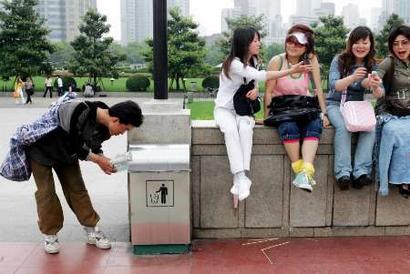Top News
'Income disparity inevitable in China'
(chinanews)
Updated: 2006-08-11 07:15
 |
Large Medium Small |
A report released by the State Development and Reform Commission shows that the Gini coefficient, an index for measuring the income disparity, has now reached 0.4, or the maximum point within the appropriate range in China's urban areas.
 A man collects recyclable garbage next to girls relaxing in a park in Shanghai, in this picture taken May 9, 2004. The gap between rich and poor in Shanghai is widening rapidly although the economy of China's financial hub grew 13.5 per cent in the first quarter of the year. [Reuters] |
An expert points out that the ever-increasing income disparity in Chinese cities is inevitable, and the situation will remain for a long time to come.
Director of the National Economic Research Institute Fan Gang says the situation of the enlarging income disparity will not change within the next five to ten years at least.
For individuals, he says, the absolute amount of their income is increasing. However, compared with other people in society, a person's individual income may not increase as fast as others, and the income gap between an ordinary person in society and high-income earners will become larger.
The situation is true of most people in society. For farmers and workers, they know that their living standard has improved.
However, compared with other people whose income has increased even faster, they may still feel that they are poor.
To some extent, Fan continues, the enlarging income disparity is inevitable and it is part of a change brought by the ongoing reform. The aim of the reform is to eliminate the absolute equal status prevalent in the past.
As a result of this reform, people's income level will surely become different. For most people, they dislike income disparity only because they believe that corruption is the main explanation for the phenomenon.
However, even if corruption is eliminated totally, the increase of income disparity is still an inevitable thing in the reform process.